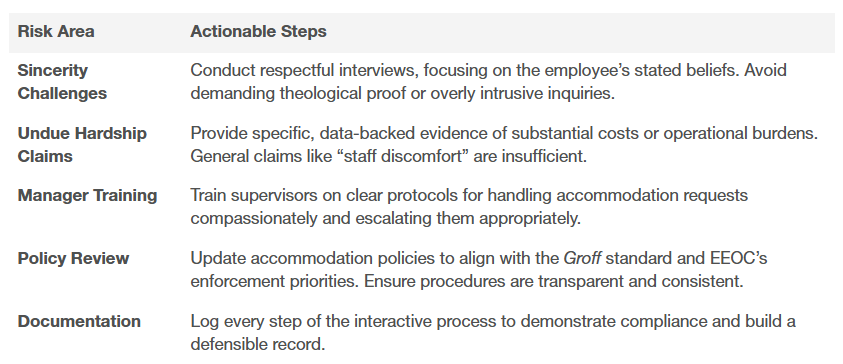The legal framework surrounding religious accommodations in the workplace has evolved significantly, driven by recent court decisions, EEOC enforcement actions, and federal guidance. Employers must gain a clear understanding of these changes, to ensure compliance with Title VII of the Civil Rights Act of 1964. With heightened scrutiny on religious exemption requests, particularly in the wake of COVID-19 vaccine mandates, employers must stay informed to avoid costly litigation and foster inclusive workplaces.
Key Court Rulings Clarify Religious Accommodation Standards
Recent judicial decisions have reshaped how employers must evaluate religious accommodation requests under Title VII. Below are pivotal cases that highlight the courts’ focus on sincerity of belief and the elevated standard for denying accommodations.
Second Circuit: Defining Sincerely Held Beliefs
In Gardner-Alfred v. Federal Reserve Bank of New York, 143 F.4th 51 (2d Cir. 2025), the Second Circuit offered critical guidance on assessing “sincerely held” religious beliefs in the context of COVID-19 vaccine mandate exemptions. The Federal Reserve Bank of New York (FRBNY) terminated two employees after denying their religious exemption requests. The court’s ruling clarified:
- Low Threshold for Sincerity: Plaintiff Gardner-Alfred’s exemption request was dismissed due to its reliance on a generic “exemption package” lacking ties to specific religious practices. Employers can expect courts to require detailed, individualized expressions of belief.
- Inconsistency Does Not Disqualify: Co-plaintiff Diaz’s claim was revived despite inconsistent behavior (e.g., using medications potentially conflicting with her religious objections). The court emphasized that imperfect adherence does not negate sincerity.
- Misunderstandings Are Valid: Diaz’s objection to mRNA vaccines, based on a mistaken belief about fetal cell lines, was deemed genuine. Employers cannot dismiss requests due to factual inaccuracies.
Other Landmark Cases
-
Groff v. DeJoy, 143 S. Ct. 2279 (2023): The Supreme Court raised the bar for denying accommodations, requiring employers to show a “substantial increased cost” or operational burden. This decision significantly strengthens employee protections.
-
Keene v. City and County of San Francisco, No. 22-16567 (9th Cir. 2024): The Ninth Circuit ruled that blanket denials of religious exemptions, without engaging in the interactive process, violate Title VII.
- Bube v. Aspirus Hospital, Inc., No. 22-cv-745 (W.D. Wis. 2024): A federal district court rejected a hospital’s denial of exemptions based on vague claims of workplace disruption, reinforcing the need for specific evidence of undue hardship.
Employers must conduct individualized, respectful inquiries into the sincerity of religious beliefs and avoid denials based on assumptions or skepticism.
EEOC’s Robust Enforcement of Religious Rights
The Equal Employment Opportunity Commission (EEOC) has intensified its focus on religious accommodations, particularly in response to COVID-19 vaccine mandate disputes. Key developments include:
Recent EEOC Appellate Decisions (August 4, 2025)
The EEOC’s Office of Federal Operations issued three decisions clarifying accommodation standards:
- Department of Veterans Affairs: A physician requesting Friday afternoons off for prayer was offered reduced hours or an overly burdensome schedule. The EEOC ruled these options unreasonable, noting that accommodations causing employee disadvantage (e.g., reduced pay) are insufficient. Claims of “low morale” among staff were also deemed inadequate justification.
- Federal Reserve Board: A law enforcement officer’s exemption request was denied without exploring accommodations or documenting hardship. The EEOC applied the Groff standard retroactively, emphasizing the need for a thorough process.
EEOC’s Enforcement Milestones (August 18, 2025)
In its “200 Days of EEOC Action to Protect Religious Freedom at Work” press release, the EEOC reported:
- Over 10,000 charges related to religious accommodations for COVID-19 vaccine mandates
- More than $55 million recovered for workers, including a $1 million settlement with Mercyhealth
- Lawsuits against organizations like Silver Cross Hospital and the Mayo Clinic for improper denials of religious exemptions
The EEOC is prioritizing robust enforcement, and employers face significant risks for cursory or unsubstantiated denials of religious accommodations.
Federal Guidance Promotes Accommodation
The Office of Personnel Management (OPM) issued memoranda on July 16 and July 28, 2025, urging federal agencies to adopt a pro-accommodation stance. Key points include:
- Emphasizing a good-faith interactive process with detailed documentation
- Encouraging low-cost solutions like telework or flexible scheduling, which require strong justification if denied
While directed at federal agencies, these guidelines reflect broader expectations for all employers under Title VII.
Practical Steps for Employers
To navigate this high-scrutiny environment, employers should adopt the following strategies.
The Lasting Impact of COVID-Era Policies
The legal and regulatory focus on religious accommodations, spurred by COVID-19 vaccine mandates, has created a lasting shift in employment law. From scheduling adjustments to exemption requests, religious considerations are now central to workplace compliance. Employers must stay proactive, ensuring policies and practices reflect the latest legal standards to avoid litigation and promote a respectful, inclusive workplace.